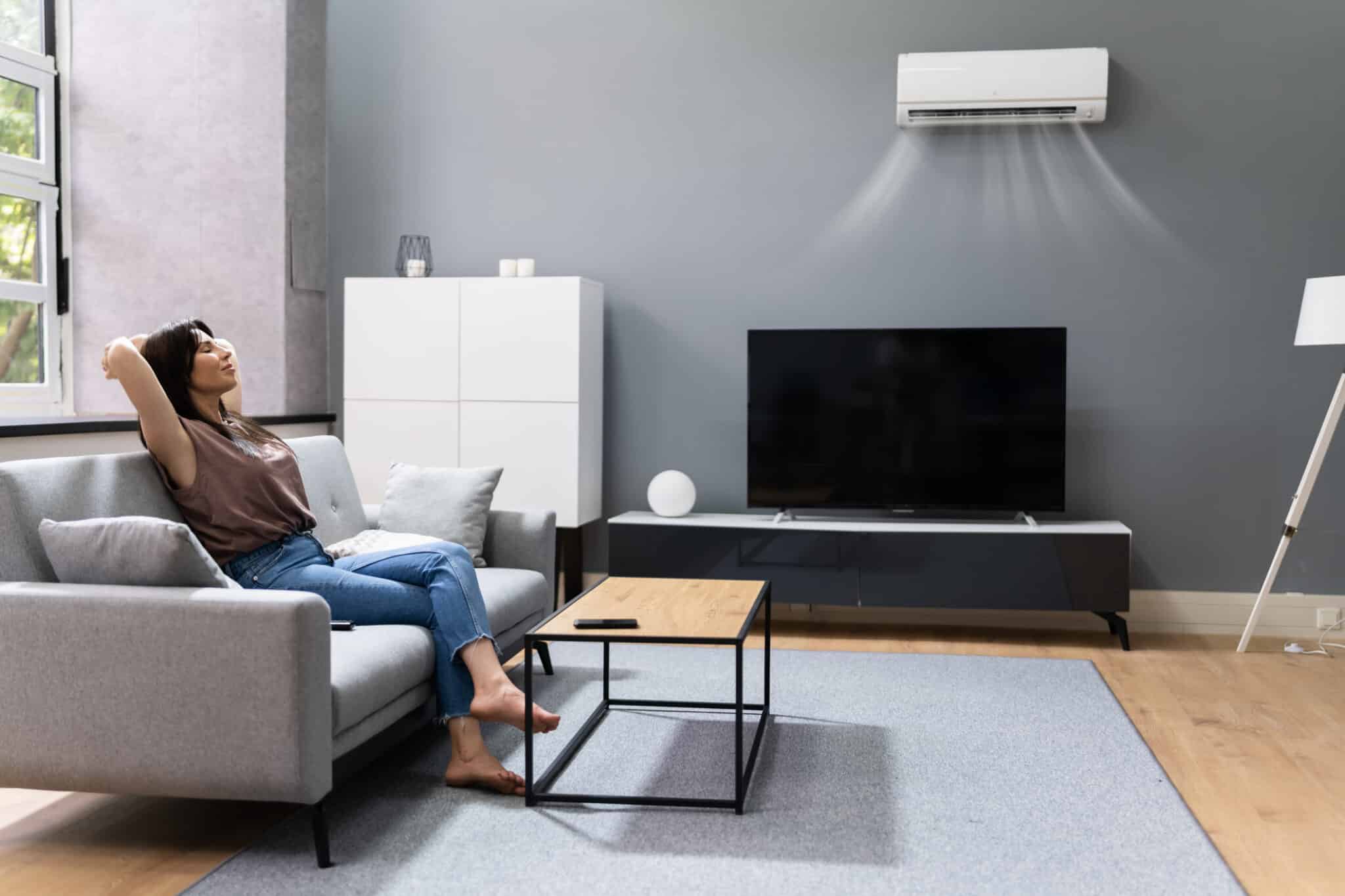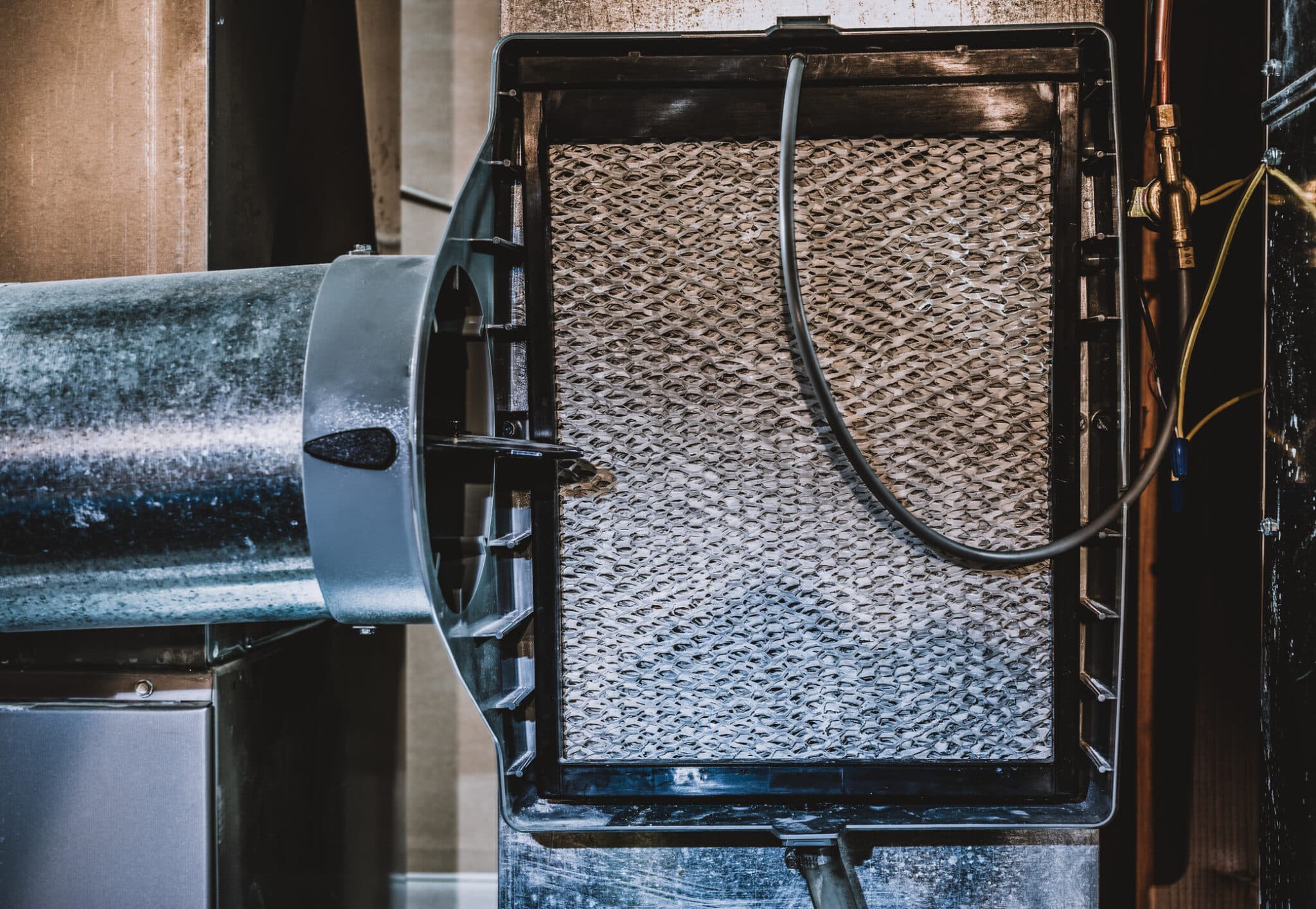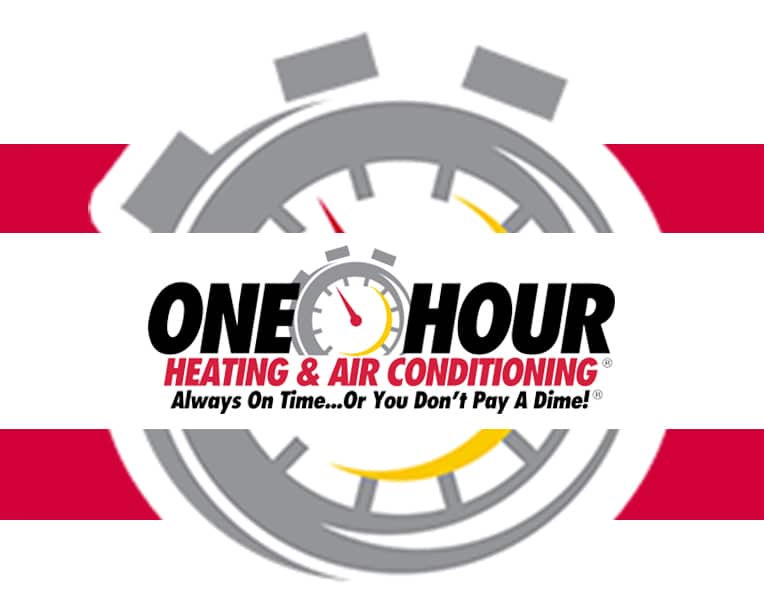HVAC Systems – Tired of dealing with sticky, uncomfortable air in your home? Proper humidity control is essential for a comfortable living environment, especially in places like San Diego, El Cajon, and Lakeside, CA.
Your HVAC system plays a vital role in not only keeping the temperature just right but also in managing humidity levels. In this blog, we’ll explore how HVAC systems work to control humidity, ensuring your home stays cozy and free from issues like mold and mildew.
Understanding the Role of HVAC Systems in Humidity Control
HVAC stands for Heating, Ventilation, and Air Conditioning. It’s the technology used to control the climate inside buildings.
So, whether it’s keeping you warm during chilly winters in San Diego, CA, or cooling you down during the hot summers in El Cajon, CA, HVAC systems are there to help. But besides keeping the temperature just right, they also manage the humidity in your home.
How HVAC Systems Manage Indoor Climate
HVAC systems manage your home’s climate through heating, cooling, and ventilation. Here’s how they do it:
- Heating: During the cold months, HVAC systems warm up your home.
- Cooling: In the hot summer months, air conditioners cool down the air inside your home.
- Ventilation: Ventilation systems bring in fresh air from outside and get rid of stale air, which helps maintain good air quality.
When it comes to humidity control, HVAC systems reduce indoor humidity by cooling the air. Imagine when you have a cold drink on a hot day, and you see water droplets forming on the outside of the glass.
Components of HVAC Systems that Affect Humidity
Air Conditioners
Air conditioners are probably the most familiar part of an HVAC system. They cool the air by removing heat, and during this process, they also reduce humidity.
As warm air passes over the cold coils of the air conditioner, moisture in the air condenses and is drained away, leaving the air inside your home cooler and less humid.
Heat Pumps
Heat pumps are versatile devices that can both heat and cool your home. In the summer, they function like an air conditioner by removing heat and moisture from the indoor air.
In the winter, they can extract heat from the outside air (even when it’s cold) and bring it inside, providing warmth without drying out the air too much.
Dehumidifiers
Dehumidifiers are specifically designed to remove excess moisture from the air. They work by drawing air over cold coils, which causes moisture to condense and be collected in a tray or drained away.
Integrating a dehumidifier with your HVAC system can significantly improve your home’s humidity control, especially in damp areas like basements.
Ventilation Systems
Proper ventilation is key to maintaining good air quality and managing humidity levels. Ventilation systems bring in fresh air from outside and expel stale, humid air from inside your home.
This exchange helps keep humidity levels in check and ensures that your indoor air remains fresh and healthy.
Types of HVAC Systems and Their Humidity Control Capabilities
Central Air Conditioning Systems
Central air conditioning systems are common in many homes. They use a network of ducts to distribute cool air throughout the house.
These systems are effective at controlling humidity because they can dehumidify the air as it cools it. This makes them a great option for hot and humid climates like San Diego, CA.
Ductless Mini-Split Systems
Ductless mini-split systems are ideal for homes without ductwork. They consist of an outdoor unit and one or more indoor units.
These systems provide excellent humidity control by dehumidifying the air directly in the rooms where the indoor units are located. This makes them a flexible option for controlling humidity in specific areas of your home, like in El Cajon, CA.
Heat Pumps
Heat pumps are highly efficient systems that can both heat and cool your home. They are particularly good at controlling humidity during the cooling process, as they remove moisture from the air just like a traditional air conditioner.
This makes them a versatile choice for maintaining comfortable humidity levels year-round.
Hybrid HVAC Systems
Hybrid HVAC systems combine a traditional furnace with a heat pump. This setup allows for efficient heating and cooling, along with excellent humidity control.
The heat pump handles the cooling and dehumidification, while the furnace takes over heating when it gets too cold for the heat pump to work effectively.
This combination is perfect for places with varying climates, ensuring comfort and humidity control in all seasons.
Advanced Technologies in Modern HVAC Systems
Smart Thermostats and Humidity Sensors
Smart thermostats allow you to control your HVAC system remotely via your smartphone or computer. They can be programmed to maintain specific temperature and humidity levels, making it easier to keep your home comfortable.
Some smart thermostats are also equipped with humidity sensors, which can automatically adjust your system to maintain optimal humidity levels.
Variable Speed Technology
Variable speed technology refers to HVAC systems that can adjust their speed to match the exact heating or cooling needs of your home.
Instead of constantly turning on and off, these systems run at different speeds to provide a more consistent and efficient performance.
This helps in better humidity control because the system can remove moisture more steadily, preventing sudden spikes or drops in humidity.
Zoning Systems
Zoning systems divide your home into different zones, each with its own thermostat. This allows you to control the temperature and humidity in each zone independently.
For instance, you might want different humidity levels in your basement compared to your living room. Zoning systems make it possible to customize your comfort and humidity control in every part of your home.

The Benefits of Humidity Control
Improved Comfort Levels
Proper humidity control ensures that your home feels comfortable all year round. High humidity can make the air feel sticky and hot, while low humidity can make it feel dry and uncomfortable.
By keeping the humidity levels balanced, you can enjoy a more pleasant living environment, whether you’re in the middle of summer in Lakeside, CA, or the cooler months in San Diego, CA.
Prevention of Mold and Mildew
Excess humidity can lead to the growth of mold and mildew, which can cause health problems and damage your home.
Controlling humidity levels helps prevent these issues, keeping your home healthier and your indoor air quality high. This is especially important in areas prone to dampness, like basements and bathrooms.
Enhanced Energy Efficiency
When your HVAC system efficiently controls humidity, it doesn’t have to work as hard to maintain a comfortable temperature.
This improved efficiency can lead to lower energy bills, as your system uses less power to achieve the same level of comfort. Efficient humidity control also extends the life of your HVAC system by reducing wear and tear.
Protection for Home Furnishings
Excessive humidity can damage your home’s furnishings, including wood furniture, flooring, and even electronics.
By keeping humidity levels in check, you can protect these valuable items from warping, mold, and other moisture-related issues. This helps maintain the quality and longevity of your home’s interior.
Choosing the Right HVAC System for Humidity Control
Assessing Your Home’s Humidity Levels
The first step is to understand the current humidity levels in your home. You can use a hygrometer, a simple device that measures humidity, to get accurate readings.
Pay attention to areas that seem particularly damp or dry. Knowing your home’s humidity profile helps you choose an HVAC system that can effectively manage these levels.
Consulting with HVAC Professionals
It’s always a good idea to consult with HVAC professionals who can assess your home and recommend the best system for your needs.
They have the expertise to evaluate your home’s size, layout, and existing climate control systems. Professionals can also help you understand the specific humidity control features of different HVAC systems and how they will benefit your home.
Evaluating Energy Efficiency and Costs
When choosing an HVAC system, consider its energy efficiency and operating costs. Systems with advanced features like variable speed technology and smart thermostats may have higher upfront costs but can save you money in the long run through lower energy bills.
Look for systems with high SEER (Seasonal Energy Efficiency Ratio) ratings, as they are more efficient and better at controlling humidity.
Installation Considerations
Professional vs. DIY Installation
While DIY installation might seem like a cost-saving option, HVAC systems are complex and require precise setup to function correctly. Professional installation ensures that all components are properly connected and calibrated, which is essential for effective humidity control.
Hiring a professional also means you benefit from their expertise and warranty protections. In the end, professional installation can save you time, money, and potential headaches.
Key Installation Steps
Here are the main steps involved in installing an HVAC system to ensure it operates efficiently:
- Site Assessment: Professionals will assess your home to determine the best location for the HVAC units.
- Ductwork Inspection: They will check existing ductwork for leaks or damage and ensure it’s suitable for the new system.
- System Setup: Installing the indoor and outdoor units, connecting refrigerant lines, and setting up thermostats.
- Testing: Running the system to check for proper operation, including temperature and humidity control.
Following these steps can ensure your HVAC system is installed correctly, maximizing its performance and longevity.
Importance of Proper Sizing and Placement
The size and placement of your HVAC system significantly affect its efficiency and ability to control humidity. A system that’s too large or too small won’t operate efficiently, leading to poor humidity control and higher energy bills.
Proper placement ensures good airflow and avoids issues like short cycling, where the system turns on and off frequently without adequately dehumidifying the air. Therefore, ensuring your system is appropriately sized and placed is critical for optimal operation.
Maintenance Tips for Optimal Humidity Control
Regular Filter Changes
One of the simplest yet most important maintenance tasks is changing your HVAC filters regularly. Dirty filters can restrict airflow and reduce the system’s efficiency, making it harder to control humidity.
Aim to change or clean your filters every one to three months, depending on usage and the type of filter. Regular filter changes help maintain good airflow and ensure your system operates efficiently.
Cleaning Coils and Condensate Drains
Over time, dust and dirt can accumulate on your HVAC system’s coils and in the condensate drains. Dirty coils can reduce the HVAC system’s ability to remove humidity, while clogged drains can lead to water damage and mold growth.
Clean the coils and drains at least once a year to keep your HVAC system running smoothly. This maintenance step is crucial for preventing issues that can affect humidity control.
Scheduling Professional Inspections
Having a professional inspect your HVAC system at least once a year is essential. During an inspection, a technician will check all components, clean and lubricate moving parts, and identify any potential issues before they become major problems.
Regular professional inspections help ensure that your HVAC system is in top condition and capable of effectively managing humidity. This proactive approach can save you from costly repairs and improve your HVAC system’s longevity.
Common Issues and Troubleshooting
Even with proper maintenance, you might encounter issues with your HVAC system’s humidity control.
Knowing how to identify and address these problems can help you maintain a comfortable and healthy home environment.
Identifying Humidity Problems
Signs of humidity problems can include:
- Condensation: Noticeable moisture on windows, walls, or other surfaces.
- Mold and Mildew: The appearance of mold or mildew in your home.
- Musty Odors: Persistent musty smells indicating excess moisture.
- Static Electricity: Frequent static shocks can indicate low humidity.
Recognizing these signs early can help you address humidity issues before they become more severe.
Simple Fixes and When to Call a Professional
For minor humidity problems, you can often take simple steps to resolve them:
- Adjust Thermostats: Use your HVAC system’s settings to maintain proper humidity levels.
- Clean Filters: Ensure filters are clean to promote good airflow.
- Check Vents: Make sure vents are not blocked, allowing air to circulate freely.
If these steps don’t solve the problem, it’s time to call a professional. Persistent issues may indicate a more serious problem with your HVAC system that requires expert attention.
Long-Term Solutions
For long-term humidity control, consider:
- Upgrading Your HVAC System: Modern systems with advanced humidity control features.
- Adding Dehumidifiers: Integrate dehumidifiers into your system for additional moisture control.
- Improving Insulation: Better insulation can help maintain consistent indoor humidity levels.
Taking these steps can provide lasting solutions to humidity problems, ensuring your home remains comfortable and healthy.
Energy Efficiency and Humidity Control
How Humidity Affects Energy Usage
High humidity can make your home feel warmer than it is, causing your air conditioner to work harder and longer to achieve the desired temperature. This increased workload can lead to higher energy bills.
Conversely, low humidity levels can make the air feel cooler, prompting your heating system to work overtime during colder months. Proper humidity control can help your HVAC systems operate more efficiently, reducing energy consumption and costs.
Tips for Reducing Energy Consumption
Here are some practical tips to help you manage humidity and energy usage:
- Use a Programmable Thermostat: Set your thermostat to adjust temperatures based on when you’re home or away to save energy.
- Seal Leaks: Ensure windows, doors, and ducts are properly sealed to prevent air leaks and maintain consistent humidity levels.
- Upgrade to Energy-Efficient Systems: Consider upgrading to an HVAC system with advanced humidity control and high energy efficiency ratings.
- Regular Maintenance: Keep your HVAC system well-maintained to ensure it operates efficiently, which includes regular filter changes and professional inspections.
- Use Ceiling Fans: Ceiling fans help circulate air, reducing the workload on your HVAC systems and aiding in humidity control.
By following these tips, you can achieve better humidity control and reduce your energy consumption, leading to lower utility bills and a more comfortable home environment.
Ensure Your Home’s Comfort Today!
Tired of dealing with humidity issues in San Diego, El Cajon, or Lakeside, CA? Trust One Hour Heating & Air Conditioning San Diego to optimize your home’s comfort with expert HVAC solutions.
Our team is ready to help you achieve the perfect balance of temperature and humidity. Call us today at 619-639-4017 to schedule an appointment and start enjoying a more comfortable living environment!

FAQ
How do HVAC systems reduce humidity?
HVAC systems reduce humidity by cooling the air. As warm air passes over the cold evaporator coils in the air conditioner, moisture condenses and is drained away, leaving the air cooler and less humid.
What maintenance is required for humidity control?
Regular maintenance includes changing filters every one to three months, cleaning coils and condensate drains annually, and scheduling professional inspections to ensure the system operates efficiently and effectively controls humidity.
Can all HVAC systems manage humidity effectively?
Not all HVAC systems are equally effective at managing humidity. Systems with advanced features like variable speed technology, integrated dehumidifiers, and smart thermostats offer better humidity control.
What are the signs of poor humidity control in a home?
Signs of poor humidity control include condensation on windows, mold and mildew growth, musty odors, and frequent static electricity. These indicate either high or low humidity levels that need to be addressed.
How does humidity affect energy usage?
High humidity makes your home feel warmer, causing your air conditioner to work harder and increase energy consumption. Conversely, low humidity can make the air feel cooler, prompting your heating system to use more energy.



















